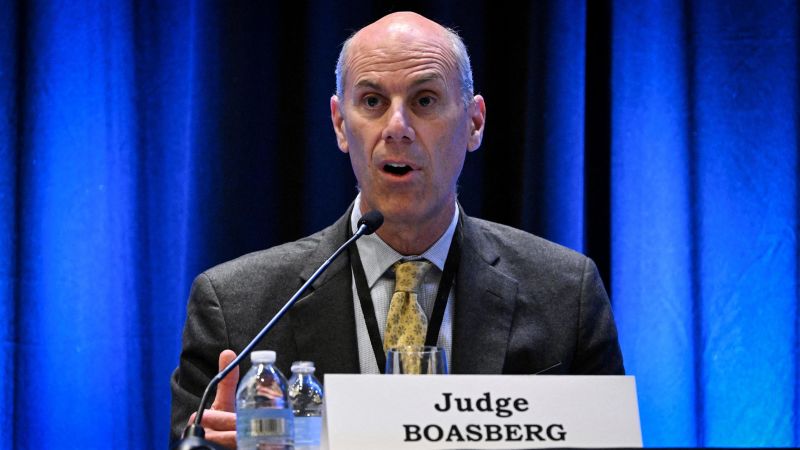CNN
—
US District Judge James Boasberg ruled Wednesday that “probable cause exists” to hold Trump administration officials in criminal contempt for violating his orders in mid-March halting the use of the Alien Enemies Act to deport alleged Venezuelan gang members.
The long-awaited decision on Wednesday from a judge President Donald Trump and his allies have repeatedly attacked puts the administration on the path toward being punished for thwarting court orders.
The situation has been a major political and legal flashpoint for the Trump White House in its efforts to carry out a historic deportation campaign, especially in mid-March when it sent three planes of migrants to a prison in El Salvador. That same day, Boasberg held an emergency hearing and told the administration to pause the migrant removals and order the return of deportation flights back to the US.
“The Court ultimately determines that the Government’s actions on that day demonstrate a willful disregard for its Order, sufficient for the Court to conclude that probable cause exists to find the Government in criminal contempt,” Boasberg wrote in a 46-page ruling detailing his decision.
“The Court does not reach such conclusion lightly or hastily; indeed, it has given Defendants ample opportunity to rectify or explain their actions,” he added. “None of their responses has been satisfactory.”
CNN legal analyst Steve Vladeck said these moves are rare.
“Holding federal executive branch officials in criminal contempt is just about unheard of, once in a blue moon,” said Vladeck, a professor at the University of Georgetown School of Law. “Part of why Chief Judge Boasberg is moving cautiously is because he’s trying to walk a tightrope, not letting the government off the hook for its misbehavior, but also not provoking pushback from either the DC Circuit or the Supreme Court.”
Skye Perryman, an attorney with Democracy Forward, which, along with the ACLU, brought the case before Boasberg, said Wednesday’s ruling “affirms what we have long known: the government’s conduct in this case is unlawful and a threat to people and our constitution.”
The ruling from Boasberg comes as the Trump administration continues to test how far it can push its compliance with court orders it disagrees with. In other cases where it appeared the administration had violated judicial edicts, judges have not gotten to the point Boasberg arrived at Wednesday.
The administration has repeatedly said that federal trial-level courts, especially, lack the authority to issue orders that could encroach on the president’s immigration policy decisions.
“The Constitution does not tolerate willful disobedience of judicial orders – especially by
officials of a coordinate branch who have sworn an oath to uphold it,” Boasberg, an appointee of former President Barack Obama, wrote in his ruling.
In the case at hand, the Supreme Court ultimately said earlier this month that the migrants who challenged Trump’s use of the Alien Enemies Act to quickly carry out deportations of alleged members of a Venezuelan gang brought their case in the wrong court.
The court’s 5-4 ruling requires those wanting to bring such challenges to rely on a complicated and rarely successful legal process known as habeas corpus, and to potentially file those claims in some of the most conservative federal courts in the nation.
Despite the high court’s decision, Boasberg said in his ruling, it’s a longstanding concept in the justice system that a party that chooses to disobey a court order before it is wiped away by a subsequent court order can still be punished.
Boasberg also cast doubt on the administration’s invocation of the state secrets privilege to avoid giving him a number of details on the flights that he wanted as he worked to decide whether his commands had been violated. The judge, however, ultimately determined that the information the government sought to shield wasn’t necessary to reach his conclusion in the contempt issue.
Boasberg, who is the chief judge of the federal trial-level court in DC, outlined the next steps in the contempt proceeding, since it is not proven yet beyond a reasonable doubt that the administration committed criminal contempt.
Boasberg says he wants sworn statements first from people who can attest to the officials making the decisions not to turn the planes around as they carried migrants to El Salvador on March 15.
Then, Boasberg says, if those statements aren’t satisfactory to him, he will ask for live witnesses to testify at hearings or depositions.
The judge could then, he says, ask the Justice Department to prosecute Trump administration officials, or he could appoint an attorney as a special prosecutor.
This story has been updated with additional developments.

